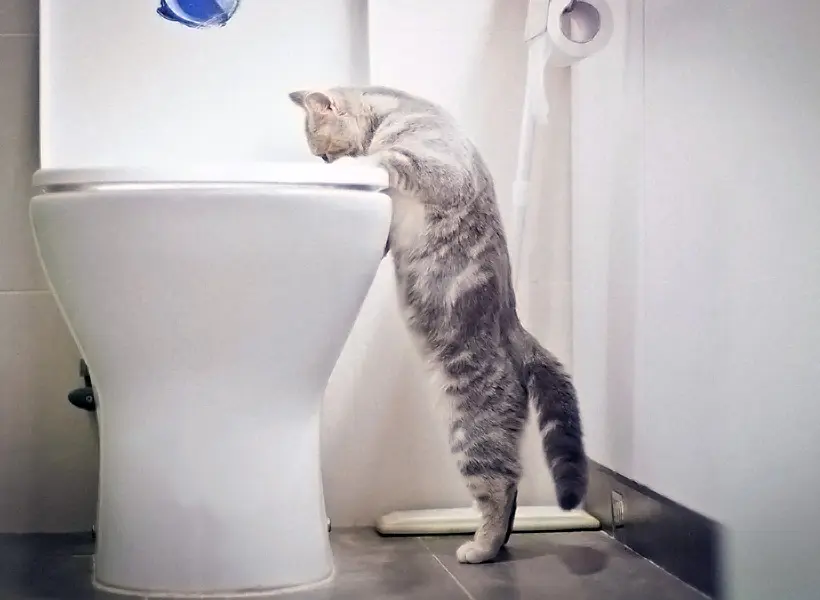Dangers of Flushing Cat Poop Down Your Toilet - Avoid Potential Problems
Dangers of Flushing Cat Poop Down Your Toilet - Avoid Potential Problems
Blog Article
This great article which follows pertaining to Can You Flush Cat Poo or Litter Down the Toilet? is amazingly entertaining. Check it out for yourself and see what you think about it.

Intro
As pet cat owners, it's essential to bear in mind exactly how we take care of our feline friends' waste. While it may appear practical to purge feline poop down the commode, this practice can have damaging repercussions for both the atmosphere and human wellness.
Environmental Impact
Flushing feline poop introduces hazardous pathogens and bloodsuckers into the water, positioning a significant threat to water ecosystems. These contaminants can negatively affect aquatic life and concession water quality.
Wellness Risks
In addition to environmental worries, purging feline waste can also present health risks to humans. Pet cat feces may consist of Toxoplasma gondii, a bloodsucker that can cause toxoplasmosis-- a possibly extreme illness, specifically for pregnant ladies and people with damaged immune systems.
Alternatives to Flushing
Fortunately, there are safer and more accountable ways to throw away pet cat poop. Consider the complying with options:
1. Scoop and Dispose in Trash
The most common technique of throwing away cat poop is to scoop it into a biodegradable bag and toss it in the garbage. Make sure to use a dedicated trash scoop and deal with the waste promptly.
2. Use Biodegradable Litter
Choose biodegradable cat trash made from products such as corn or wheat. These litters are eco-friendly and can be safely gotten rid of in the trash.
3. Hide in the Yard
If you have a lawn, take into consideration hiding cat waste in an assigned area away from vegetable gardens and water sources. Make sure to dig deep sufficient to stop contamination of groundwater.
4. Set Up a Pet Waste Disposal System
Buy a family pet waste disposal system especially designed for feline waste. These systems make use of enzymes to break down the waste, minimizing odor and ecological effect.
Conclusion
Liable pet ownership expands beyond supplying food and sanctuary-- it also includes appropriate waste management. By avoiding flushing feline poop down the bathroom and going with alternate disposal approaches, we can minimize our environmental impact and protect human health.
Why You Should Never Flush Cat Poop Down the Toilet
A rose by any other name might smell as sweet, but not all poop is created equal. Toilets, and our sewage systems, are designed for human excrement, not animal waste. It might seem like it couldn’t hurt to toss cat feces into the loo, but it’s not a good idea to flush cat poop in the toilet.
First and foremost, assuming your cat uses a litter box, any waste is going to have litter on it. And even the smallest amount of litter can wreak havoc on plumbing.
Over time, small amounts build up, filling up your septic system. Most litter sold today is clumping; it is made from a type of clay that hardens when it gets wet. Ever tried to scrape old clumps from the bottom of a litter box? You know just how cement-hard it can get!
Now imagine just a small clump of that stuck in your pipes. A simple de-clogger like Drano isn’t going to cut it. And that means it’s going to cost you big time to fix it.
Parasitic Contamination
Believe it or not, your healthy kitty may be harboring a nasty parasite. Only cats excrete Toxoplasma in their feces. Yet it rarely causes serious health issues in the cats that are infected. Most people will be fine too if infected. Only pregnant women and people with compromised immune systems are at risk. (If you’ve ever heard how women who are expecting are excused from litter cleaning duty, Toxoplasma is why.)
But other animals may have a problem if infected with the parasite. And human water treatment systems aren’t designed to handle it. As a result, the systems don’t remove the parasite before discharging wastewater into local waterways. Fish, shellfish, and other marine life — otters in particular — are susceptible to toxoplasma. If exposed, most will end up with brain damage and many will die.
Depending on the species of fish, they may end up on someone’s fish hook and, ultimately on someone’s dinner plate. If that someone has a chronic illness, they’re at risk.
Skip the Toilet Training
We know there are folks out there who like to toilet train their cats. And we give them props, it takes a lot of work. But thanks to the toxoplasma, it’s not a good idea.

We were guided to that report about How to Dispose of Cat Poop and Litter Without Plastic Bags from an acquaintance on another website. If you liked our post please be sure to pass it around. Many thanks for taking the time to read it.
Book A Free Estimate Report this page